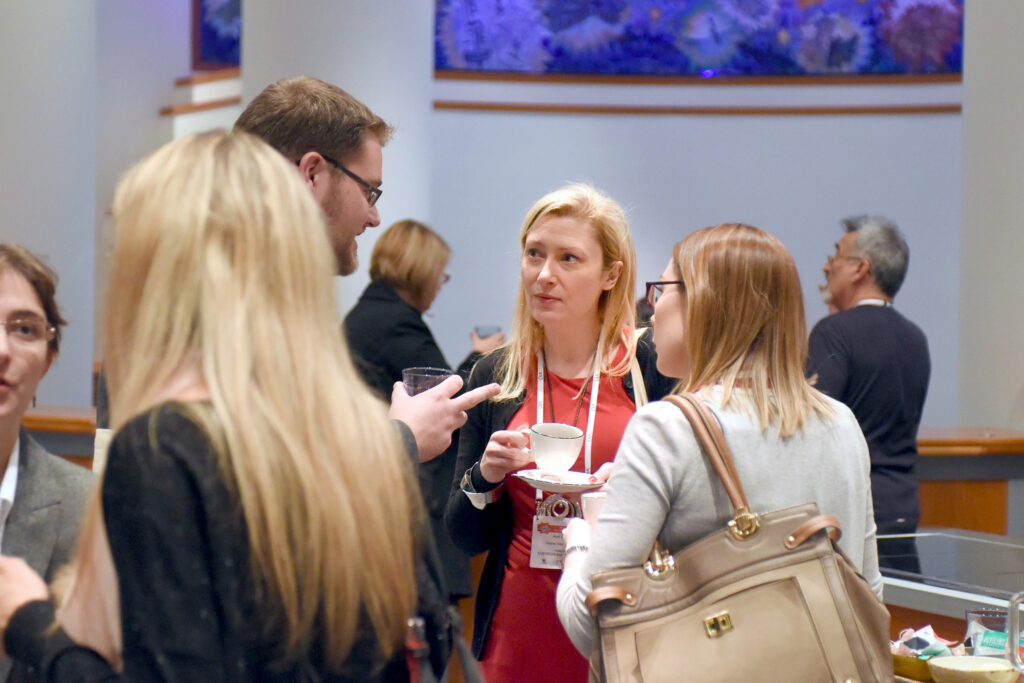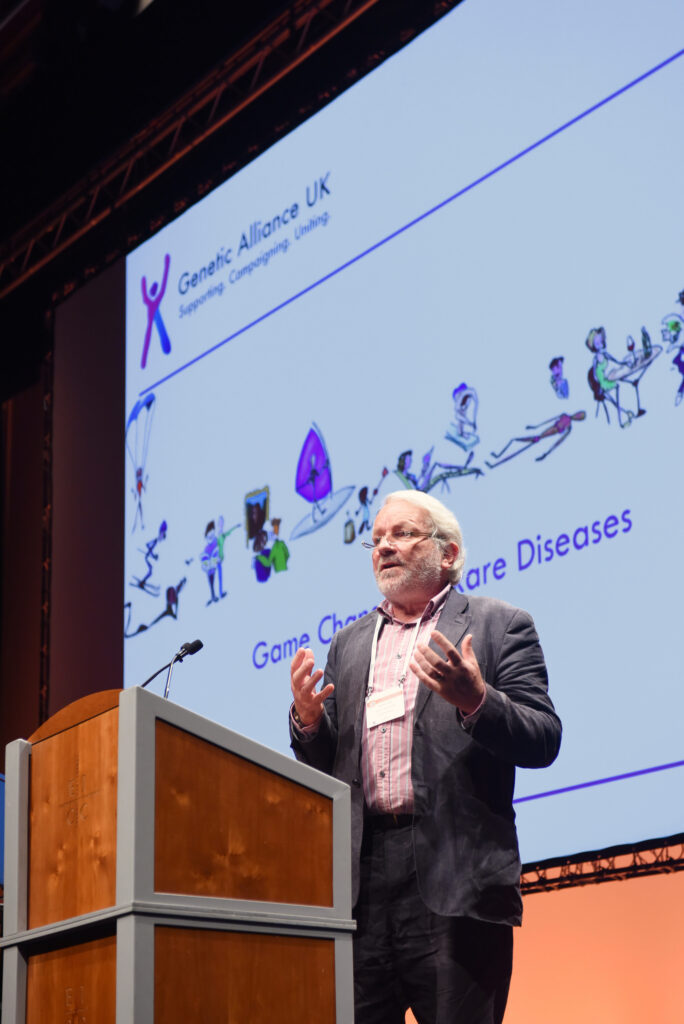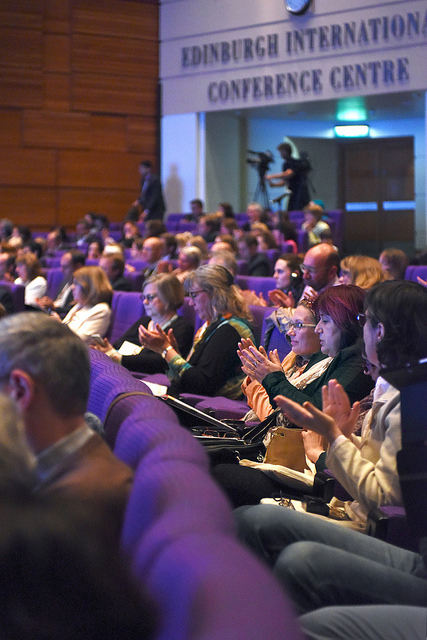In this week’s blog, Oliver talks about attending the 8th European Conference on Rare Diseases and Orphan Products (ECRD) In Edinburgh. Where he was asked to present DevelopAKUre as a game changer in drug development, authorisation and access. Oliver also explains the important initiatives announced and how they can help AKU patients.

The ECRD is the biggest patient group conference in Europe. It’s held once every two years, and organised by EURORDIS (Rare Diseases Europe). It aims to bring together patient groups from all over Europe, pharmaceutical companies, regulators, and representatives from national health systems. The ECRD promotes engagement with all stakeholders in rare diseases, and so collaboration with other organisations is encouraged.
The meeting was opened by Eurordis president, Terkel Anderson, who introduced speakers from the Scottish government and the European Commission. This was the first ECRD to be held in the UK, in Edinburgh, and so the Scottish government were pleased to give their support.
After the introductions, Alastair Kent, Chairman of the Genetic Alliance UK, opened the formal meeting with his keynote address. His talk demonstrated the development of medicines, from diagnosis by stars and planets 2,500 years ago, to genetic screening today. Much of the conference focused on new development in research, treatments and care for rare disease patients. The overall theme was game changers in rare diseases; and was split into several categories: game changers in research, Diagnosis, drug development; authorisation and access, care provision, social policy and in global security
I was asked to present on the DevelopAKUre clinical trials as an example of a game changer in drug development; authorisation and access. DevelopAKUre is unique, as it combines expertise from patient groups and industry to create a true patient-led clinical trial.
For me, the three main take home messages from the ECRD were:
ERNs and ePAGs
ERNs (European Research Networks) and ePAGs (European Patient Advocacy Groups) are two connected projects due to start this year. ERNs are European Commission funded networks, designed to link clinical centres that have a particular expertise in rare diseases. There will be 20 networks, ranging from rare cancers to rare eye diseases. ePAGs are the patient group equivalent, with 20 groups for each of the ERNs.

For AKU patients, the most relevant network is the one focusing on ‘Rare connective tissue and musculoskeletal diseases’. The National AKU Centre (NAC) in Liverpool has applied to become part of the clinical network, and the AKU Society as part of the patient group network.
The idea behind networks is to help identify and correctly treat patients with rare diseases in Europe. For example, if the NAC was part of an ERN, then patients diagnosed with AKU anywhere in Europe would be referred to the NAC for advice. The NAC could then help local doctors provide the best care for their patients.
Eurordis have more information about ERNs at http://www.eurordis.org/content/getting-ready-erns and ePAGs at http://www.eurordis.org/content/epags
Rare Diseases International
Rare Diseases International is a new initiative led by Eurordis and supported by several other international rare disease groups. Their goal is to unite rare disease patients worldwide, and demonstrate that rare diseases is a global issue. They aim to increase visibility of rare diseases, empower patients, create universal access to healthcare, promote rare disease research and encourage co-operation in rare disease policy across country boarders.
Many international federations have signed up to join Rare Diseases International, and they are next planning to work with the United Nations (UN) and World Health Organisation (WHO) to gain their advice on making rare diseases an international concern.
More information about Rare Diseases International can be found at http://www.rarediseasesinternational.org/
Health Technology Assessment (HTA)
Health Technology Assessment (HTA) is the process where licensed drugs are judged by individual countries to see if they are worth their cost. Countries typically look at the expected benefits of the drug, compare against any other available treatments and decide if the cost of the drug will fit into the expected national health budget.
For AKU patients, HTA may soon become important. The DevelopAKUre clinical trials are currently researching whether nitisinone is an effective treatment for AKU. If the trials show that nitisinone works to treat AKU, then we can apply to the European Medicines Agency (EMA) for a license for the drug. If awarded the license, it means that the drug is safe to use and effective as a treatment. We would then need to work with HTA bodies in each country in Europe to see if they would pay for patients to have access to the drug.
Obviously, contacting every country in Europe and asking them to assess a new drug is time-consuming. Therefore, to ensure the quickest possible access to nitisinone after the trials finish, we can start that process now. At the ECRD, I had the chance to investigate two Eurordis initiatives that could make the process even quicker:
– MoCA (Mechanism of Coordinated Access) is an alliance of 15 countries in Europe, which can assess new drugs simultaneously, meaning that you can cut down the time it would take to contact each country.
EUnetHTA (European Network of Health Technology Assessment) is a new project that aims to create a European wide alliance where every country could assess new drugs at the same time. This would massively cut down the time it takes to apply for access to new drugs. However, there are several issues, with different countries in Europe having access to vastly different budgets. Currently, EUnetHTA has been proposed but is not yet in place.
Overall, the ECRD is a great way for the AKU Society to stay connected to the rest of the rare disease world, and learn about new projects that can help our patients in better ways.
If you’d like to find out more about the ECRD, or other conference the AKU Society attends, email Oliver Timmis, at oliver@akusociety.org

